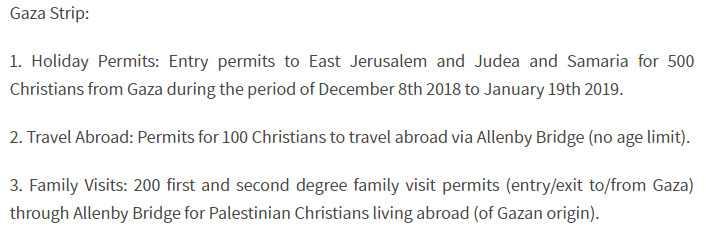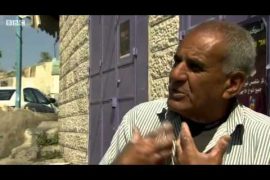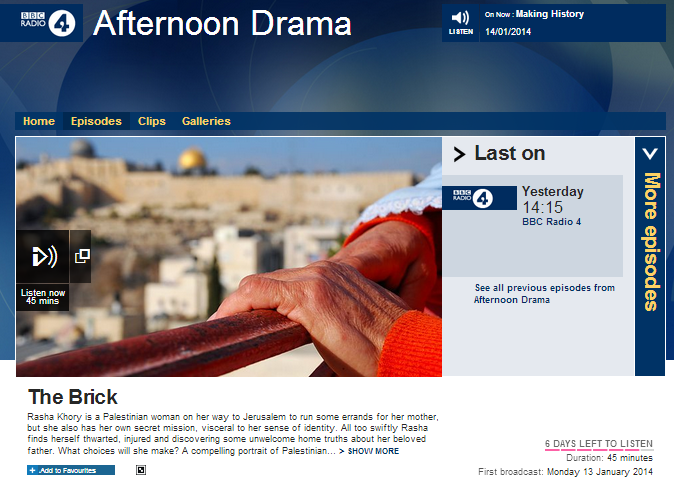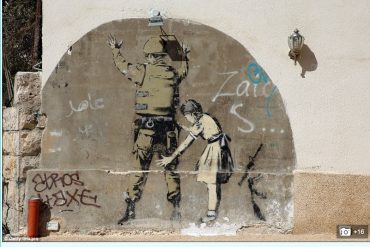h/t FB
On the morning of December 24th BBC Radio 4’s ‘Today‘ programme aired yet another report produced during Mishal Husain’s recent visit to the Gaza Strip.
Presenter Justin Webb introduced the item (from 1:42:48 here) as follows: [emphasis in bold added]
Webb: “This time last week we were reporting from Gaza and for its small Christian community this of course is the time of year when many dream of getting to Bethlehem which isn’t, after all, that far away to celebrate Christmas. However, given the blockade maintained by Israel – it says of course that’s for security reasons – travelling to the West Bank requires special permission which many do not get. Mishal Husain went to meet Palestinian Christians at one church in Gaza City.”
Having described the scene at a reception for a “visiting delegation from Jerusalem” and spoken to a couple of children, Mishal Husain further amplified that introductory messaging.
Husain: “But the hardships of life here are not far away, especially at this time of year.”
Unidentified Woman: “There is no real Christmas in Gaza. We used to long for Christmas so we could travel and go to Bethlehem but none of the young people this year got permission. We don’t really feel the Christmas spirit in Gaza.”
Husain: “Permits to travel are difficult to obtain, as they are for other Palestinians who live here. Christmas is no exception as Sister Maria de Nazerat – a nun who came here from Argentina – explains.”
Sister Maria: “They need a special permission from Israel. They ask a lot of time but not always will receive the permission or maybe some of them can have permission or on the same family some of them no. For example the children has permission and the parents no. Every year it’s a very difficult situation because they wait, they hope, they want to go pray in Bethlehem but most of them cannot go.”
Throughout this report Mishal Husain is conspicuously silent on the topic of how many Christians actually currently live in the Gaza Strip. In April of this year the Catholic News Agency reported that “[i]n the past six years the number of Christians in the Gaza Strip has plummeted from 4,500 to just 1,000”. In contrast to Husain’s claim, Christmas (and Easter) is an exception: every year special arrangements are made for Palestinian Christians by COGAT and those pertaining to Gaza residents this year can be seen below.

In other words, permits were available for the Christian population of the Gaza Strip and while the number of applications made is unknown, according to a report in the Jerusalem Post “[s]ome 600 individuals received special permits for the holidays”. So as we see, the BBC’s claim that “many do not get” travel permits fails to reflect the fact that 60% of the Gaza Strip’s Christian population did receive them.
The second theme promoted by Husain in this report involves whitewashing the problems faced by Christians in the Gaza Strip. Husain introduced “the parish priest Father Mario de Silva”.
De Silva: “We don’t have problems to worship God here and we are doing our work.”
Husain: “Because some people might wonder what it is like with Hamas governing Gaza. Is that a problem for the community?”
De Silva: “Not at all. They never did any problem to us about religious or…”
While one can of course comprehend Father de Silva’s recurrent promotion of that messaging, the BBC should have been able to tell its audiences that the true picture is actually somewhat different.
“Rami Ayyad owned a religious bookstore in Gaza. He had been involved in numerous charitable organizations and was also a member of the Baptist Church. His store and charity organization, the Bible Society, had been a frequent target of Muslim extremists. A grenade was thrown at the building during protests over the publication of a Danish cartoon that depicted the prophet Mohammed. Ayyad had also received continuous death threats for his perceived missionary work. He was married with two small children, and was just two weeks shy of his 30th birthday when [in October 2007 – Ed.] he was found shot in the head and stabbed multiple times 10 hours after he was kidnapped from his store.
One Christian leader expressed his fear after months of increased attacks: “This latest incident is aimed at sending a message to all the Christians here that we must leave. Radical Islamic groups are waging a campaign to get rid of us and no one seems to care.” Many in Gaza’s tiny Christian community, including the Baptist Church’s full-time pastor and twelve of Ayyad’s bookstore employees, fled to the West Bank to escape further violence.
The head of Gaza’s Roman Catholic Church, Rev. Mauel Musallem, said he knows seven families that sold their properties in Gaza and left for safer pastures in the aftermath of Ayyad’s slaying. Fifteen more were preparing to do the same, he said.”
In 2012 reports of cases of forced conversions to Islam came out of the Gaza Strip. This year Gaza’s Christians have been warned in flyers distributed by an armed terror group that ‘celebrating Christmas is evil’.
Nevertheless, Radio 4 listeners heard nothing of such incidents in a report obviously intended to promote the politically motivated narrative that Gaza’s Christian population lives happily under Hamas rule, with its only tribulations caused by Israel.
Related Articles:
BBC Radio 4 ‘Today’ Gaza Strip special – part one
BBC Radio 4 ‘Today’ Gaza Strip special – part two
BBC Radio 4 ‘Today’ Gaza Strip special – part three
BBC Radio 4 ‘Today’ Gaza Strip special – part four
BBC Radio 4 ‘Today’ Gaza Strip special – part five
Mishal Husain does ‘life in Gaza’ for BBC One TV




